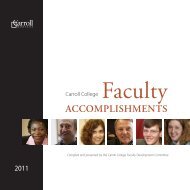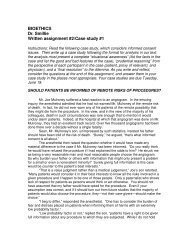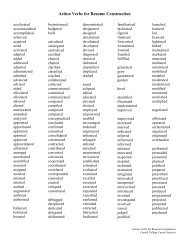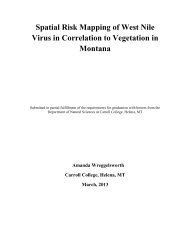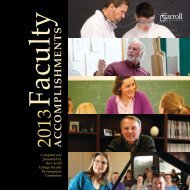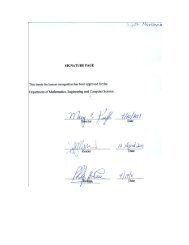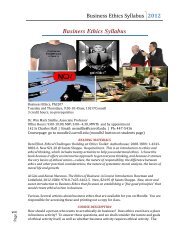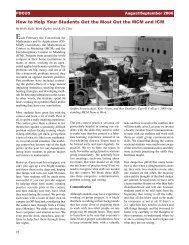Medieval Philosophy - Carroll College
Medieval Philosophy - Carroll College
Medieval Philosophy - Carroll College
You also want an ePaper? Increase the reach of your titles
YUMPU automatically turns print PDFs into web optimized ePapers that Google loves.
<strong>Medieval</strong> <strong>Philosophy</strong> Syllabus, Spring 2012Course SyllabusCourse InformationPHIL202, <strong>Medieval</strong> <strong>Philosophy</strong>Monday, Wednesday, Friday, 9:00-9:50, 102 O’Connell3 credit hoursInstructor InformationDr. Wm Mark Smillie, Associate Professor142 St Charles HallEmail: msmillie@carroll.eduPh: 447-5416Office Hours: 3:00-4:30, MW; 9:30-11:00, TTh; and by appointmentCourse page (Learning Management System): go to moodle.carroll.edu(you will need to enroll in the course)Reading MaterialsJoseph W. Koterski An Introduction to <strong>Medieval</strong> <strong>Philosophy</strong>: Basic Concepts. Wiley-Blackwell, 2009. ISBN: 978-1-4051-0678-8 $33.95 (new; used 25.50) at theSaint’s Shoppe. Required Text. This is a topic introduction to seven mainthemes/problems discussed throughout the “medieval period” of philosophy. It givesa student/reader a really good view of the areas of philosophical discussion commonto many figures.Aurelius Augustine. The Essential Augustine. Edited by Vernon J. Bourke. HackettPublishing Company, 1964-74. ISBN: 0-915144-07-7. $12.95 Saints Shoppe.Required text. A compilation of texts from St. Augustine’s writings grouped into tenthemes from his thinking, edited by one of the foremost Augustinian scholars of the20 th Century. St. Augustine (354-430) is one of the giants of the Christianintellectual tradition and influenced medieval thought for a thousand years. He wasbishop of Hippo, Africa, from 397-430. His major works are Confessions, City ofGod, and De Trinitate.Page1(Anicius Manlius Severinus) Boethius. Consolation of <strong>Philosophy</strong>. Revised Edition.Translated by Victor Watts. Penguin, 1999. ISBN 0-13-183942-X. $11.25 (used),Saints Shoppe. Required text. Classic 6 th Century text which was one of the most
<strong>Medieval</strong> <strong>Philosophy</strong> Syllabus, Spring 2012Course Learning ObjectivesI have designed this course to introduce students to some chief issues of medievalphilosophy, and to increase student abilities to read medieval philosophical texts,understand and critically think about the ideas of medieval thinkers.Students taking this course will1. Identify and discuss major themes of medieval philosophy2. Identify and discuss contributions of medieval thinkers to themes of medievalphilosophy3. Comprehend and critically assess philosophical texts and arguments4. Think objectively and critically about philosophical issues and express theirideas orally and in written form5. Appreciate the contributions of medieval thinkers to philosophical analysisDisclaimer regarding these objectives:1) Students may vary in their competency levels on these abilities.2) Students can expect to acquire these abilities only if they honor all coursepolicies, attend class regularly, complete all assigned work on time and ingood faith, and meet all other course requirements and expectations.Description of Evaluation/Assessment ProceduresStudent achievement toward the learning objectives will be assessed by the following(descriptions of each follow below):Argument Analyses: 15%Lectures: 15%In-Class Tests: 30% (50/50)Final Exam: 10%Two Essays: 30% (50/50)Argument Analyses: These are analyses of arguments found in our readings. Eachanalysis should identify• The passage where the argument appears• The conclusion of the argument—what it purporting to support or prove• The premises of the argument—why the conclusion should be adopted. Theseshould include both explicit and implicit premises.• Some comment (more involved as the semester goes on) about the strengthof the argument, including its validity (or form) and its soundness (are itspremises acceptable and plausible)Initially these assignments will be weekly, then they will become bi-weekly. I willassign the passages for the first three. After that, the student may pick theargument from the assigned readings since the last argument analysis. They will bedue on Thursdays, according to the following schedule:Page3
<strong>Medieval</strong> <strong>Philosophy</strong> Syllabus, Spring 20125you to think during class. For reasons that I am well aware of, many students findtalking in class strange, difficult, awkward, maybe even embarrassing; for some ofyou, it signifies a failure to conform and support the “student status quo.” (To thoseof you, I say “fight the man,” damn the status quo, and speak your mind (even ifyour voice shakes a little).) I hope that we all will get used to talking with eachother in class, and will do my best to make talking in class safe for all of us bylearning how to express disagreement with respect and tact.Class Meetings: In the interests of transparency: the (re)presentation of thematerial from the readings is not my goal for class meetings, nor do I see that evenas my job. It would be therefore foolish to skip the class readings with the excusethat the professor will tell you everything you need for the test in class. My goals forclass meetings are to remind you of the bigger picture, to relate the information toother relevant information, to look at particularly interesting or difficult (or both)aspects of the reading, to practice and apply the lessons of the reading, and to makeup our minds about the material we are looking at.Learning Management System (Moodle)Every student must log onto Moodle ASAP (see Students page on <strong>Carroll</strong> website)and “enroll” in this course. The moodle site is a “learning management system” thatintegrates with the course and classroom activities.• All written assignments should be submitted electronically on moodle (use theappropriate assignment upload).• All assignments will be graded electronically on moodle—go there to viewyour grade and comments from the instructor.• The moodle grade book is my grade book for this course; all your grades willbe recorded there. Look there to find your current grade. (If something isincorrect or missing, you should contact me.)• The moodle calendar is the official calendar for the course as well—it willinclude reading assignments as well as other assignments.• Moodle has copies of this syllabus, other relevant course information and helpsheets, and other assigned readings not in the texts required for the course.Basic EtiquetteAll students should practice good manners in class and show civility to all. A positiveattitude is appreciated and a professional demeanor should be the baseline. Thisincludes such things as remaining alert (and awake!) in class, respecting and neverinterrupting others, limiting private conversations, turning phones and pagers off,and controlling any urges to text to others. Please, no eating or using tobaccoproducts in class (a small beverage is allowed).In team or group situations, students should cooperate with their team members andobtain their input when working on group exercises and projects. Most group workinvolves a required peer assessment of each individual’s contribution to the group.Absolutely no electronic devices are allowed during exams, and this includes cellphones, laptops, and mp3 players/devices. Laptops are allowed at other timesduring class, with the expectation that you are using them to participate in the classand not as a distraction.
<strong>Medieval</strong> <strong>Philosophy</strong> Syllabus, Spring 2012Course Schedule6W DATE Topic/Assignment1 Jan 9 First day of class!Jan 11 Historical context setting: “In the Light of the Above” (Second Episodeof The Day the Universe Changed series)Jan 13 Historical context setting: Read the Introduction, An Introduction to<strong>Medieval</strong> <strong>Philosophy</strong> (MP).2 Jan 16 Martin Luther King Day: No classJan 17: Last day to add a course or select audit statusJan 18 Faith and Reason. Read MP, Ch 1.Jan 20 Chapter 1 of MP: Faith and Reason.Additional Reading: Selections from St Justin, Tertullian, Clement(texts available on moodle)3 Jan 23 Faith and Reason. Read Essential Augustine (EA): 21-41Jan 25 Faith and Reason: Augustine on the Levels of RealityEA: pgs 43-74Jan 27 Faith and Reason “The saint and the scholar: portrait of Abelard”Read: Selections from Abelard’s Calamities, and Letters to Heloise(available on moodle)4 Jan 30 <strong>Philosophy</strong> and Theology. Read Thomas Aquinas (TA), pgs 50-66Feb 1 <strong>Philosophy</strong> and Theology. Read TA, pgs 50-67; 133-138Feb 3 God: Read Chapter 2 of MP.5 Feb 6 God’s relation to the world. EA, pgs 98-119.Feb 8 God: Proving God’s existence: Anselm’s Proslogion and responses ofGaunilo. (readings on moodle)Feb 10 Anselm’s Proslogion and Guanilo’s responses6 Feb 13 President’s Day: no classFeb 15 Review for test #1Feb 17 TEST #17 Feb 20 Cosmological Proofs: TA, pgs 243-256. Maimonides, Guide for thePerplexed, Part 2, ch 1 (available on moodle)Feb 22 Cosmological Proofs: TA, pgs 243-256. Maimonides, Guide for thePerplexed, Part 2, ch 1 (available on moodle)Feb 24 Knowing and speaking about God: EA, pgs 121-148.8 Feb 27 Knowing and speaking about God: EA, pgs 121-148.Feb 29 Knowing and speaking about God: God’s Simplicity. TA, pgs 290-330Mar 2 Knowing and speaking about God: God’s Simplicity. TA, pgs 290-3309 Mar 5- Spring Break: No Class. Grades posted on March 7.91 Mar 12 11 th and 12 th Century Islam. Video: Selection from Cities of Light0 Mar 14 The Divine Ideas: Read Chapter 3 of MPMar 16 The Divine Ideas: Read Chapter 3 of MP1 Mar 19 The Divine Ideas: Read Chapter 3 of MP1 Mar 21 Augustine on Time: EA, 228-242Mar 23 The Problem of Universals. Read Chapter 4 of MP.1 Mar 26 The Problem of Universals. Read Chapter 4 of MP.2 Mar 28 The Problem of Universals. Read Chapter 4 of MP.Mar 30 Thomas Aquinas on the existence of Universals.
<strong>Medieval</strong> <strong>Philosophy</strong> Syllabus, Spring 20127W DATE Topic/AssignmentRead: TA On Being and Essence, chs 1-3, pgs3-401 Apr 2 Review for Test #23 Apr 4 TEST #2Apr 6 Good Friday: no Class1 Apr 9 Easter Monday: no Class4 Apr 11 The Transcendentals and the Problem of Evil. Read Chapter 5 of MP.Apr 13 The Transcendentals and the Problem of Evil. Read Chapter 5 of MP.1 Apr 16 Consolation of <strong>Philosophy</strong>. Books I-II5 Apr 18 Consolation of <strong>Philosophy</strong>. Books III-IVApr 20 Consolation of <strong>Philosophy</strong>. Books V1 Apr 23 Cosmos and Nature. Read Chapter 6 of MP.6 Apr 25 Cosmos and Nature. Read Chapter 6 of MP.Apr 27 Last Class Day17May 2 Final Exam: 8:00-9:45 (WED)COURSE POLICIESAttendance and Tardiness“Eighty percent of success is showing up.” Attributed to Woody AllenRegular attendance is a college policy (see <strong>College</strong> Catalogue, pg 40). I keepattendance regularly and expect to be informed if some legitimate excuse keeps youfrom attending class. Students missing more than nine class sessions may be askedto drop the class. Tardiness is disruptive to other members of the class, so please beon time!Late exams/assignments: Assignments are considered late if they are turned inafter 5:00 of the day they are assigned. Late assignments will be penalized one halfa letter grade for every day they are late. Missed exams may be retaken at the ARCwithin one week of the exam date. (Students must make their own arrangementswith the director of the ARC, and then inform me of their scheduled makeup date.)Students having good reasons for missing a deadline or test should contactme in advance of the deadline. Good reasons include documented medical reasons,documented court obligations, and athletic team commitments, family emergencies.Deadlines will be reset to mutually agreed times in these situations.Academic Honesty<strong>Carroll</strong> <strong>College</strong>’s policy on Academic Integrity is stated in both the CC Catalogue andin the Student Handbook. The policy reads: “Students at <strong>Carroll</strong> <strong>College</strong> are expectedto have high standards of integrity. Any student who cheats or plagiarizes onexaminations or assignments, falsifies college records, or fails to give requestedacademic information on admission documents is subject to dismissal or otherappropriate disciplinary action by the <strong>College</strong>.” Students violating the policy will bereferred to the Vice President for Academic Affairs. Please see these publications forthe correct procedures to follow if you have questions concerning the conduct of thisclass or the grading procedures (other than a final grade).Plagiarism is an act of fraud and will not be tolerated. Plagiarism is both stealingsomeone else’s work and lying about it. It includes the following• Turning in anyone else’s work (including other students’) as your own
<strong>Medieval</strong> <strong>Philosophy</strong> Syllabus, Spring 2012• Copying without giving credit (including copying from the internet)• Not putting quotations in quotation marks• Incorrectly identifying the source of a quotation8Plagiarism also includes copying the sentence structure of a source, even if youchanged words, and copying so many words or ideas from a source that it makes upthe majority of your work, whether you give credit or not.All suspected cases of plagiarism will be investigated, and where verified, willbe penalized; the penalty can be a severe as immediate failure in the course. If youare unsure about whether some actions constitute plagiarism, please ask me.<strong>Carroll</strong> <strong>College</strong> Campus support servicesThe Academic Resource Center, located in Simperman Hall, helps students becomeacademically successful through services such as peer tutoring, advice on studyskills, workshops, and academic counseling. Please stop by or contact the director(Joan Stottlemyer) to request help. The hours at the resource center are: Monday-Thursday 9 am-4 pm; Friday 9 am-12 noon. Evening Tutoring: Sunday-Thursday 7pm-9 pm.In its recognition of the unique value of each human being, the college iscommitted to making reasonable accommodations for qualified students withdisabilities. Students with special needs should contact the Academic ResourceCenter (ext 4504) for further information.The moodle pages for the course contain other study or assignment aids, andpaper and debate format. Studying <strong>Philosophy</strong> contains specific guidelines forwriting papers in philosophy.General DisclaimerThe above schedule, policies, and assignments in this course are subject to change inthe event of extenuating circumstances or by mutual agreement between theinstructor and the students.Background information about your instructorI am an associate professor in the <strong>Philosophy</strong> Department. I received a B.A.from Thomas Aquinas <strong>College</strong> (CA) in 1983; a Ph.D. in 1992, from the University ofNotre Dame. I have taught at Notre Dame, Merrimack <strong>College</strong> (North Andover, MA),North Shore Community <strong>College</strong> (Danvers & Lynn, MA), Allentown <strong>College</strong>, (CenterValley, PA), the University of Indiana at South Bend, and Bethell <strong>College</strong>(Mishawaka, IN).I teach various philosophy courses here at <strong>Carroll</strong> including <strong>Philosophy</strong> ofHuman Nature, Business Ethics, Bioethics, Environmental Ethics, and <strong>Medieval</strong><strong>Philosophy</strong>. My research interests are in <strong>Medieval</strong> <strong>Philosophy</strong>, especially thephilosophy of St. Thomas Aquinas, and applied ethics. I have givenpapers/presentations on: Catholic Identity, St. Thomas on God’s Omnipotence, Endof Life Decision-Making, using technology in the classroom (including Moodle).I’ve been married 25 years and have eight kids (including a <strong>Carroll</strong> grad, classof 2008!). I am involved in various community organizations in Helena and enjoyvisiting historical sites, hiking, photography, building things from time to time (andeven house remodeling).
<strong>Medieval</strong> <strong>Philosophy</strong> Syllabus, Spring 2012GRAPHIC SYLLABUSWeek MAIN COURSE DIVISIONS COURSE TOPICS1MEDIEVAL PHILOSOHY: HISTORY AND OUTLOOK92FAITH AND REASONFaith and Reason3Scientia and Sapientia4GOD<strong>Philosophy</strong> and Theology5God’s Relation to the World6 TEST ONEProof for God’s Existence7-8Knowing God9 SPRING BREAK10-11THE DIVINE IDEASAugustine on Time11-12THE PROBLEM OF UNIVERSALS13 TEST TWOAquinas on Universals1415TRANSCENDENTALS/PROBLEM OF EVILBoethius: Consolation of <strong>Philosophy</strong>16COSMOS AND NATURE17 FINAL EXAM



